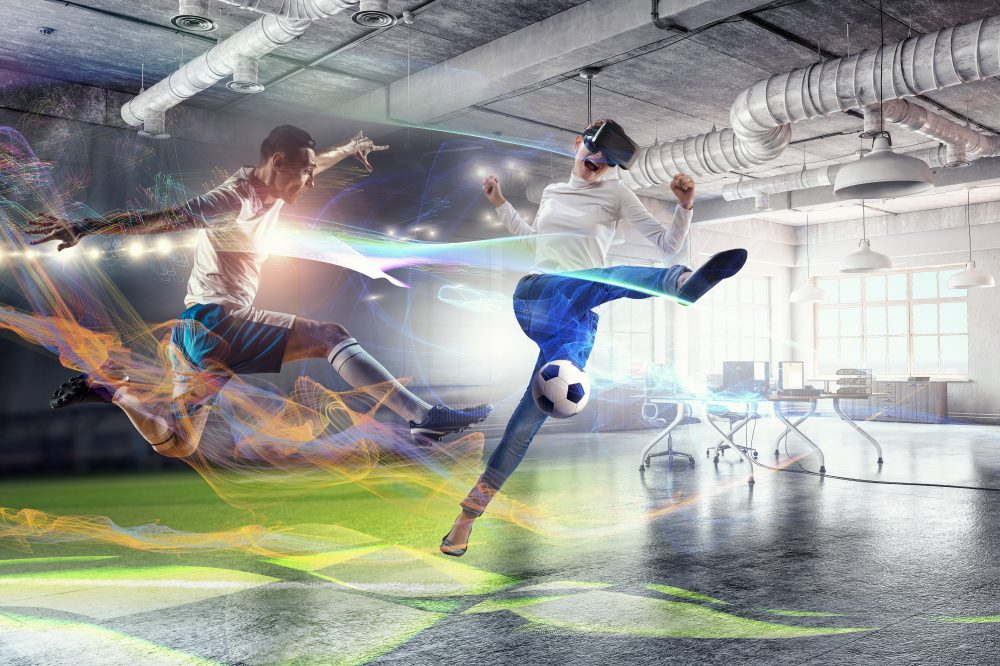AI is developing at a rapid pace and advertisers need to remain flexible to stay ahead.
Mainstreaming the Metaverse
Thanks to a pandemic-induced reality shift, virtual tech is pushing into the mainstream. As people become more comfortable living their lives virtually instead of in person, people are diving deeper into the “metaverse,” an immersive experiential environment that blends our virtual and physical worlds. It’s the perfect convergence of the right tech at the right time.
Interest and attention will only continue to grow as the “metaverse” gets covered in news outlets like The New York Times, The Washington Post, and Fast Company. It’s also getting attention in the ad world with AdWeek’s new Metaverse Marketing podcast, which aims to help marketers and brands understand the full potential of these evolving technologies. This is supported by our proprietary macrotrend Surreal World: where mind-blowingly high-tech creations bend perceptions, inspire wonder, and command attention, driven by values like ingenuity, imagination, curiosity, and play.
Some brands are already tapping into mixed reality, augmented reality, and virtual experiences in creative ways to offer otherworldly excitement. “Metaversed” sports, retail, and beauty experiences intrigue the imagination and set new frontiers for commerce. Read on to learn more.
SPORTS
While the NFL is still a TV ratings juggernaut, there are signs that suggest the league and the teams can’t rest on their laurels before making an effort to deepen engagement and grow its fanbase. Sports brands are thrilling people with hyper-realistic digital creations that seem indistinguishable from real life. Earlier this month, Carolina Panther fans watched a giant digital panther rampage and tear down a virtual Jets banner through stadium video screens, while fans at home saw this unfold on TV. The video display appeared lifelike as the panther overlayed a live feed of the stadium in real-time, reflecting realistic details like the fans in the stands and the current weather. The excitement had even non-fans intrigued. As word of the stunt spread, people flocked to social to watch and share the video on the team’s Twitter (5.7M views), Facebook ( 3.1M views) and YouTube (260,000+ views) channels. The mixed reality panther was created by fan experience company The Famous Group, and rendered using their Unreal Engine 3D creation tool. The event excited and inspired fans, and created a memorable opening weekend for football season.
RETAIL
The sneaker industry is valued at $79 billion as of 2020 and is set to reach $120 billion by 2026. This is largely due to drop culture, whose exclusivity hype sky-rockets demand. At the same time, savvy entrepreneurs are creatively siphoning chunks of retail drops, thus ballooning costly reseller markets and leaving many customers frustrated. Thankfully, metaverse technologies are expanding people’s options by creating new digital territories for drop culture. Location-based sneaker gaming app Aglet is serving its 100,000+ users a gamified sneaker shopping experience. The game runs similarly to Pokémon GO. Players walk around the physical world to collect augmented reality sneakers in geo-fenced real-world locations, earning in-game currency by walking, and compete against other players to secure limited edition prizes – including IRL Yeezys earlier this month. Since its launch in late 2020, the app is striving to be a go-to commerce platform where brands can increase playful engagement with fans virtually. Going a step further, the platform also uplifts aspiring designers. Streetwear entrepreneurs can design virtual shoes for sale in-app, gain popularity, and provoke real-world commerce. Looking ahead, Aglet plans to roll out trading functions and NFT shoe collections to deepen the exclusive digital-to-real-world incentives.
BEAUTY
There’s a lot of trial and error in shopping for the right beauty products. With a plethora of product options and ingredients, people are easily overwhelmed and frustrated. And this too often leads to disengagement and feelings of apathy. To combat dissonant feelings, some beauty brands are upping the ante by transporting people into immersive and personalized digital experiences. In July, innovative skincare brand Dermalogica launched a virtual e-commerce storefront, accessible via their website – no VR headset necessary. Within the virtual store, people are greeted by pleasant background music and digital rooms free of wandering visitors. They can “walk around” to view and learn about the latest products, trial their AI Face Mapping tool for a skin analysis, locate the nearest Dermalogica aesthetician, and make instant purchases. In just two weeks from launch, the virtual store received over 17,000 page views. As the year progresses, Dermalogica aims to add a livestream shopping feed into the digital store and a live chat function with aestheticians. These features will extend the blending of our digital and physical worlds further, strengthening the virtual shopping experience.
Taking cues from the Carolina Panthers, Aglet and Dermalogica, brands in other categories can increase excitement and engagement by adding an experiential metaverse layer. For example, a fast casual brand could create a location-based AR gaming app that incentivizes people to earn in-game currency via walking that then translates into in-store discounts. Gamify the experience by having people seek out and collect various virtual menu items scattered across real-world areas. Include an element of competition where monthly leaderboard winners receive free delivery on orders for 30 days. The overall experience will encourage healthy lifestyles, escapist fun, and repeat purchases. Spread the word of your game in indulgent channels and dayparts such as late-night video and high-traffic commuting hours on radio when people are craving your brand the most.




